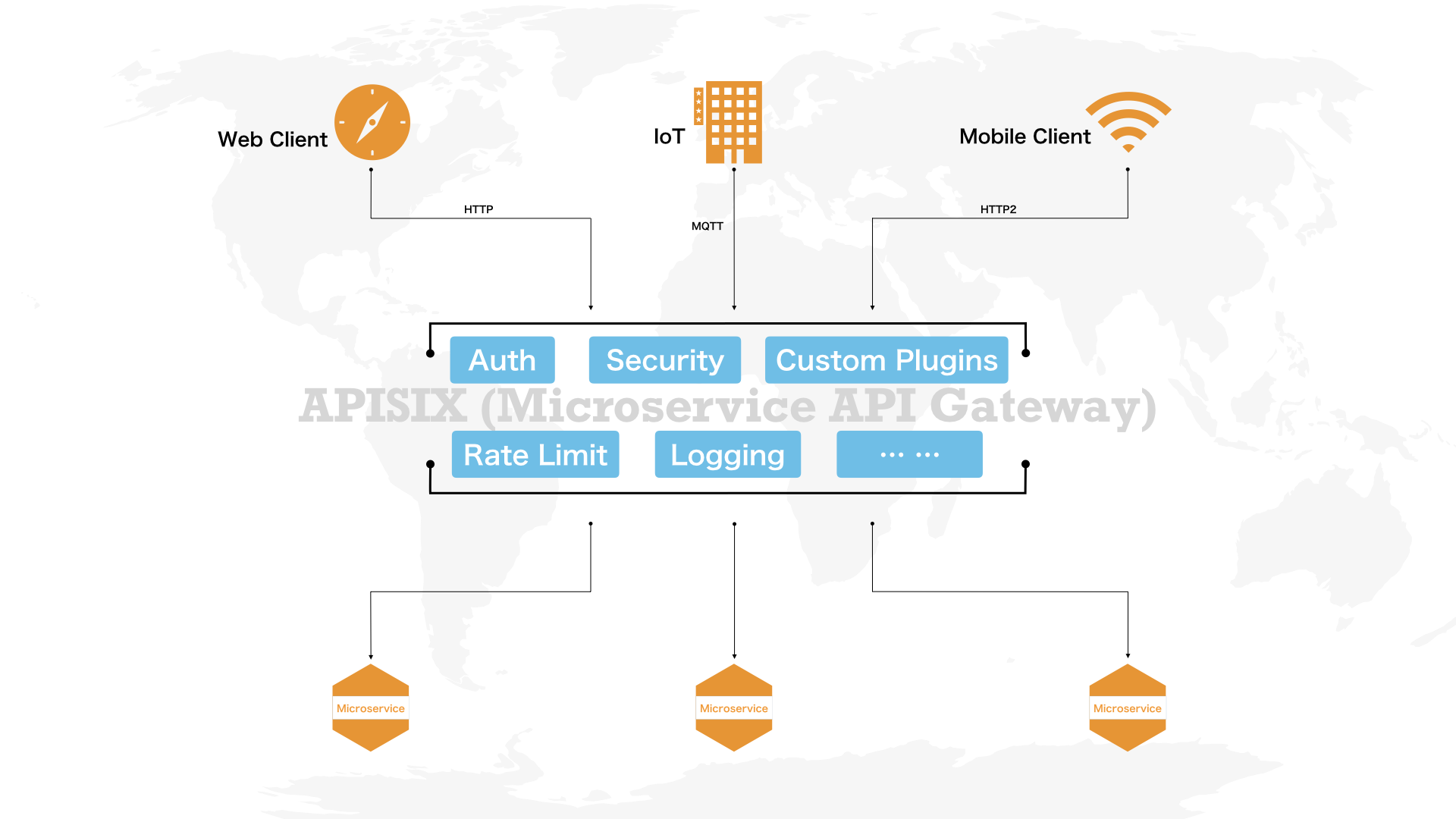|
|
||
|---|---|---|
| bin | ||
| conf | ||
| doc | ||
| lua | ||
| t | ||
| utils | ||
| .gitignore | ||
| .luacheckrc | ||
| .travis.yml | ||
| apisix-0.4-2.rockspec | ||
| CODE_OF_CONDUCT.md | ||
| COPYRIGHT | ||
| LICENSE | ||
| Makefile | ||
| README_CN.md | ||
| README.md | ||
APISIX
- QQ group: 552030619
What's APISIX?
APISIX is a cloud-native microservices API gateway, delivering the ultimate performance, security, open source and scalable platform for all your APIs and microservices.
APISIX is based on OpenResty and etcd. Compared with traditional API gateways, APISIX has dynamic routing and plug-in hot loading, which is especially suitable for API management under micro-service system.
Why APISIX?
If you are building a website, mobile device or IoT (Internet of Things) application, you may need to use an API gateway to handle interface traffic.
APISIX is a cloud-based microservices API gateway that handles traditional north-south traffic and handles east-west traffic between services.
APISIX provides dynamic load balancing, authentication, rate limiting, and other plugins through plugin mechanisms, and supports plugins you develop yourself.
For more detailed information, see the White Paper.
Plugins
Now we support the following plugins:
- dynamic load balancing: load balance traffic across multiple upstream services, supports round-robin and consistent hash algorithms.
- key-auth: user authentication based on Key Authentication.
- limit-count: rate limiting based on a "fixed window" implementation.
- limit-req: request rate limiting and adjustment based on the "leaky bucket" method.
- limit-conn: limite request concurrency (or concurrent connections).
- prometheus: expose metrics related to APISIX and proxied upstream services in Prometheus exposition format, which can be scraped by a Prometheus Server.
Install
APISIX Installed and tested in the following systems:
| OS | OpenResty | Status |
|---|---|---|
| CentOS 7 | 1.15.8.1 | √ |
| Ubuntu 18.04 | 1.15.8.1 | √ |
| Debian 9 | 1.15.8.1 | √ |
You now have two ways to install APISIX: if you are using CentOS 7, it is recommended to use RPM, other systems please use Luarocks.
We will add support for Docker and more OS shortly.
Install from RPM for CentOS 7
sudo yum install yum-utils
sudo yum-config-manager --add-repo https://openresty.org/package/centos/openresty.repo
sudo yum install -y openresty etcd
sudo service etcd start
sudo yum install -y https://github.com/iresty/apisix/releases/download/v0.4.1/apisix-0.4-1.noarch.rpm
You can try APISIX with the Quickstart now.
Install from Luarocks
Dependencies
APISIX is based on OpenResty, the configures data storage and distribution via etcd.
We recommend that you use luarocks to install APISIX, and for different operating systems have different dependencies, see more: Install Dependencies
Install APISIX
sudo luarocks install apisix
If all goes well, you will see the message like this:
apisix is now built and installed in /usr (license: Apache License 2.0)
Congratulations, you have already installed APISIX successfully.
Install APISIX Development Environment
If you are a developer, you can set up a local development environment with the following commands.
git clone git@github.com:iresty/apisix.git
cd apisix
make dev
If all goes well, you will see this message at the end:
Stopping after installing dependencies for apisix
The following is the expected development environment directory structure:
$ tree -L 2 -d apisix
apisix
├── bin
├── conf
├── deps # dependent Lua and dynamic libraries
│ ├── lib64
│ └── share
├── doc
│ └── images
├── lua
│ └── apisix
├── t
│ ├── admin
│ ├── core
│ ├── lib
│ ├── node
│ └── plugin
└── utils
Quickstart
- start server:
sudo apisix start
- try limit count plugin
For the convenience of testing, we set up a maximum of 2 visits in 60 seconds, and return 503 if the threshold is exceeded:
curl http://127.0.0.1:9080/apisix/admin/routes/1 -X PUT -d '
{
"uri": "/index.html",
"plugins": {
"limit-count": {
"count": 2,
"time_window": 60,
"rejected_code": 503,
"key": "remote_addr"
}
},
"upstream": {
"type": "roundrobin",
"nodes": {
"39.97.63.215:80": 1
}
}
}'
$ curl -i http://127.0.0.1:9080/index.html
HTTP/1.1 200 OK
Content-Type: text/html
Content-Length: 13175
Connection: keep-alive
X-RateLimit-Limit: 2
X-RateLimit-Remaining: 1
Server: APISIX web server
Date: Mon, 03 Jun 2019 09:38:32 GMT
Last-Modified: Wed, 24 Apr 2019 00:14:17 GMT
ETag: "5cbfaa59-3377"
Accept-Ranges: bytes
...
Benchmark
Using Google Cloud's 4 core server, APISIX's QPS reach to 60,000 with a latency of only 500 microseconds.
You can view the benchmark documentation for more detailed information.
Documentation
English Development Documentation: TODO
Contributing
Contributions are welcomed and greatly appreciated.
Acknowledgments
inspired by Kong

